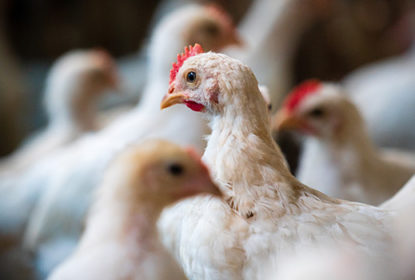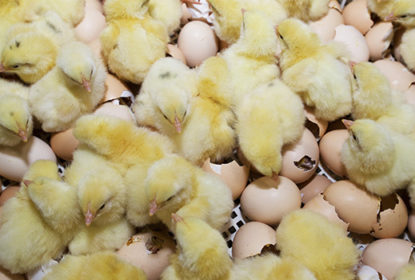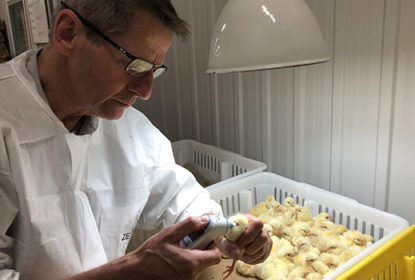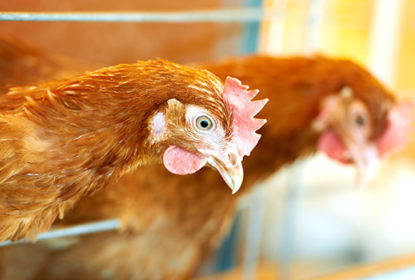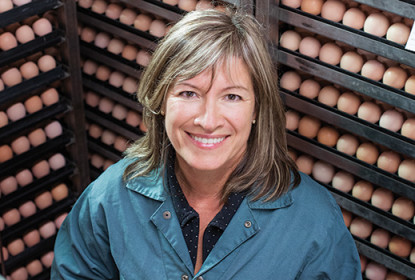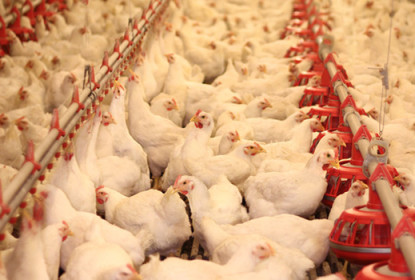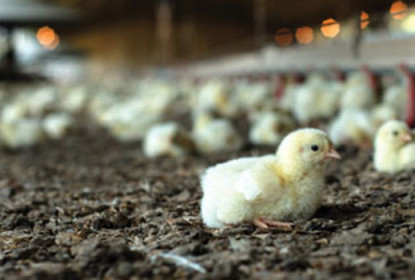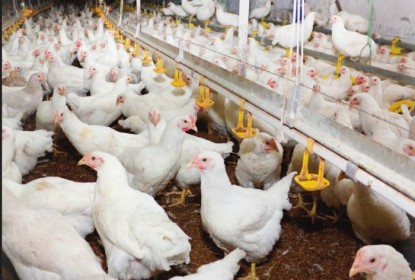Tag Archive: Don Waldrip, Eimeria oocysts, NAE, necrotic enteritis, no antibiotics ever, Zoalene
... NAE producers need to focus on Eimeria oocysts for more effective control of coccidiosis, necrotic enteritis
Dec 06, 2022Jennifer GrullonComments Off on NAE producers need to focus on Eimeria oocysts for more effective control of coccidiosis, necrotic enteritis
By Don Waldrip, DVM, Senior Technical Service Veterinarian, Zoetis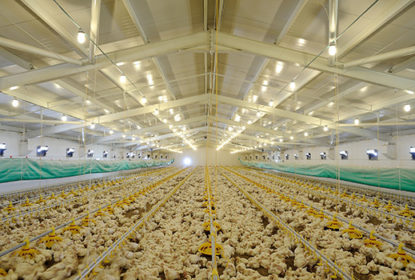
Biosecurity, Global TOP NEWS, Gut Health, Interviews, News, PHT GLOBAL, PHT US, Podcast, TOP NEWS, Videos
... Comparing necrotic enteritis litter models highlights performance impacts
Apr 06, 2022Jennifer GrullonComments Off on Comparing necrotic enteritis litter models highlights performance impacts
Reused litter from a previous NE challenge led to more severe subclinical performance impacts but fewer clinical signs of disease than in birds raised on fresh litter.... IBDV linked to severe necrotic enteritis in broiler chickens
Oct 10, 2021Jennifer GrullonComments Off on IBDV linked to severe necrotic enteritis in broiler chickens
Broiler chickens exposed to infectious bursal disease virus are likely to develop more severe cases of the bacterial disease, necrotic enteritis, researchers in Canada have found.
Antibiotic-free, Global TOP NEWS, Gut Health, Interviews, News, PHT GLOBAL, PHT US, Podcast, Research, TOP NEWS, Videos
... Glutamine supplement shows promise in reducing necrotic enteritis
Oct 26, 2020Jennifer GrullonComments Off on Glutamine supplement shows promise in reducing necrotic enteritis
Supplementing poultry diets with glutamine could help reduce the severity of necrotic enteritis (NE), according to researchers.... ‘Causal’ pie chart can help manage necrotic enteritis
Dec 29, 2019Jennifer GrullonComments Off on ‘Causal’ pie chart can help manage necrotic enteritis
Use of a simple “causal” pie chart is proving to be a helpful tool for controlling necrotic enteritis (NE).... Necrotic enteritis control requires multi-pronged approach in RWA systems
Oct 17, 2019Jennifer GrullonComments Off on Necrotic enteritis control requires multi-pronged approach in RWA systems
Feeding higher levels of copper and zinc in the diet, managing litter moisture and controlling coccidiosis are keys to stopping necrotic enteritis (NE) in poultry raised without antibiotics (RWA),...... World poultry industry still struggling with necrotic enteritis
Jun 27, 2019Jennifer GrullonComments Off on World poultry industry still struggling with necrotic enteritis
NE remains a formidable challenge in broilers raised without antibiotics, and preventing the disease means steering clear of predisposing factors and implementing a rigid coccidiosis-control plan.... A few tools to improve brooding, not antibiotic alternatives, are key to NE prevention
May 20, 2019Jennifer GrullonComments Off on A few tools to improve brooding, not antibiotic alternatives, are key to NE prevention
By Reg Smith, Vice President, Operations, Atlantic Poultry, Nova Scotia, Canada, Formerly Chair, British Poultry Council’s Antibiotic Stewardship strategy... Life without antibiotics: Field lessons learned the hard way
Apr 15, 2019Jennifer GrullonComments Off on Life without antibiotics: Field lessons learned the hard way
Producers need to think long and hard before jumping into “no antibiotics ever” (NAE) poultry production.... Navigating the maze of alternative products for necrotic enteritis control
Apr 08, 2019Jennifer GrullonComments Off on Navigating the maze of alternative products for necrotic enteritis control
The effectiveness of antibiotic alternatives is going to vary among “no antibiotics ever” production systems, and it’s up to the producers to figure out which alternatives will work.... Early exposure to Clostridium protects birds from necrotic enteritis
Feb 21, 2019Jennifer GrullonComments Off on Early exposure to Clostridium protects birds from necrotic enteritis
Early exposure to Clostridium perfringens in used litter may be a way to minimize the impact of necrotic enteritis (NE) in broilers, Steve Davis, DVM, told Poultry Health Today.... Necrotic enteritis control helps reduce Salmonella colonization
Feb 07, 2019Jennifer GrullonComments Off on Necrotic enteritis control helps reduce Salmonella colonization
Maintaining good intestinal health in broilers is essential for minimizing the presence of Salmonella in birds sent for processing, Manuel Da Costa, DVM, PhD, associate director for Outcomes Research...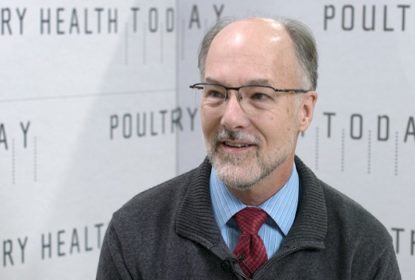
Antibiotic-free, Global TOP NEWS, Gut Health, Interviews, News, PHT GLOBAL, PHT US, Podcast, TOP NEWS, Videos
... Coccidiosis control, litter management key to NE prevention in broilers raised without antibiotics
Jan 10, 2019Jennifer GrullonComments Off on Coccidiosis control, litter management key to NE prevention in broilers raised without antibiotics
Good coccidiosis control and litter management are the two most important steps producers can take to prevent necrotic enteritis (NE) in flocks raised without antibiotics.... Trace minerals, used litter, coccidiosis control key to managing enteritis in NAE flocks
Sep 06, 2018Jennifer GrullonComments Off on Trace minerals, used litter, coccidiosis control key to managing enteritis in NAE flocks
Starting broiler flocks on used litter, coupled with effective coccidiosis control and the use of trace minerals, can help minimize necrotic enteritis (NE) in broiler flocks raised without...... Research focusing on new controls for coccidiosis, relationship with Salmonella
Aug 02, 2018Jennifer GrullonComments Off on Research focusing on new controls for coccidiosis, relationship with Salmonella
Alternative products for coccidiosis control remain the focus of research, but so far, the results are inconsistent, Sam Hendrix, DVM, veterinarian and researcher at Colorado Quality Research, told...... Special Report: Nixing necrotic enteritis in broilers
Jul 09, 2018Jennifer GrullonComments Off on Special Report: Nixing necrotic enteritis in broilers
This week poultry specialists will gather in Denver, Colorado, for the second International Conference on Necrotic Enteritis. In this special report, Poultry Health Today looks at the impact of this...... Two symposia on poultry enteric disease set stage for 2018 AAAP Conference
Apr 05, 2018Jennifer GrullonComments Off on Two symposia on poultry enteric disease set stage for 2018 AAAP Conference
Two symposia focused on enteric disease in poultry will be held immediately prior to the 2018 American Association of Avian Pathologists (AAAP) annual conference set for this July in Denver.... Necrotic enteritis and age of litter: What’s the connection in broilers?
Jan 02, 2018Jennifer GrullonComments Off on Necrotic enteritis and age of litter: What’s the connection in broilers?
Broilers raised on used litter develop better immunity to necrotic enteritis (NE) than birds raised on new litter when challenged early with Clostridium perfringens, Steve Davis, DVM, president of...... Deadly duo: Study shows link between E. maxima, Clostridium
Dec 12, 2017Jennifer GrullonComments Off on Deadly duo: Study shows link between E. maxima, Clostridium
New research by Callie McQuain, DVM, veterinarian and grad student at the University of Georgia, substantiates anecdotal field experience indicating that Eimeria maxima is the type of coccidia that...... Necrotic enteritis: Can it be managed effectively in NAE flocks?
Nov 10, 2017Jennifer GrullonComments Off on Necrotic enteritis: Can it be managed effectively in NAE flocks?
Necrotic enteritis (NE) is not only a big problem in flocks raised without antibiotics, there’s a wide variation in how it presents itself, Steve Davis, DVM, president of Colorado Quality Research,...... Coccidiosis, necrotic enteritis challenge cage-free layer systems
Aug 30, 2017Jennifer GrullonComments Off on Coccidiosis, necrotic enteritis challenge cage-free layer systems
Cage-free housing for egg layers allows birds to exhibit more natural behaviors, but it also carries an increased risk for morbidity and mortality...... Veteran poultry scientist optimistic about managing necrotic enteritis in NAE flocks
Jul 14, 2017Jennifer GrullonComments Off on Veteran poultry scientist optimistic about managing necrotic enteritis in NAE flocks
The trend toward “no antibiotics ever” (NAE) poultry production has no doubt spawned problems with necrotic enteritis (NE), but the industry is making progress in its search for alternative...... Managing coccidia ‘leakage’ in antibiotic-free production systems
Jun 27, 2017Jennifer GrullonComments Off on Managing coccidia ‘leakage’ in antibiotic-free production systems
The US broiler industry has long relied on coccidial leakage to create immunity against coccidiosis in chickens. In antibiotic-free production systems, leakage occurs but can be more challenging to...... Get to know the lesser-known risk factors of necrotic enteritis in broilers
Nov 10, 2016Jennifer GrullonComments Off on Get to know the lesser-known risk factors of necrotic enteritis in broilers
By John A. Smith, DVM, MS, MAM Alectryon LLC Baldwin, Georgia... Broiler study shows challenges and potential of drug-free production
Jul 08, 2016Jennifer GrullonComments Off on Broiler study shows challenges and potential of drug-free production
Broilers raised in a drug-free program had a higher feed-conversion ratio (FCR), decreased mean daily weight and decreased mean live marketing weight despite administration of antibiotic... Tyson vet shares experiences with antibiotic-free broilers
Jun 02, 2016Jennifer GrullonComments Off on Tyson vet shares experiences with antibiotic-free broilers
Producing Salmonella-free chicks without antibiotics is a delicate procedure — sort of a little like baking a cake, says Scott Gustin, DVM, director of veterinary services for Tyson.... Five opportunities to optimize gut health, minimize necrotic enteritis in broilers
May 16, 2016Jennifer GrullonComments Off on Five opportunities to optimize gut health, minimize necrotic enteritis in broilers
By Suzanne Dougherty, DVM, MAM, MS, DACPV Pecking Around Consulting, Inc. Madison, Ala.
Antibiotic-free, Global TOPICS, Gut Health, ippe2016- Interviews with experts, News, PHT GLOBAL, PHT US, Videos
... Alternative treatments for necrotic enteritis: Has CQR’s Steve Davis found the ‘silver bullet’?
Apr 29, 2016Jennifer GrullonComments Off on Alternative treatments for necrotic enteritis: Has CQR’s Steve Davis found the ‘silver bullet’?
For years Steve Davis, DVM, of Colorado Quality Research had been looking for what he calls the "silver bullet" for managing NE in broilers without antibiotics.... Necrotic enteritis in broilers: Disease or syndrome?
Apr 26, 2016Jennifer GrullonComments Off on Necrotic enteritis in broilers: Disease or syndrome?
Steve Davis, DVM, of Colorado Quality Research, talks about emerging virulent strains of Clostridium perfringens and their impact on the prevalence severity of necrotic enteritis in broilers.... Necrotic enteritis: In search of the silver bullet
Apr 09, 2016Jennifer GrullonComments Off on Necrotic enteritis: In search of the silver bullet
Steve Davis, DVM, of Colorado Quality Research says there’s no “silver bullet” for managing necrotic enteritis in broilers and shares his observations from recent studies.
Announcements, Antibiotic-free, Flock welfare, Food Safety, Gut Health, Infectious Diseases, ippe2016 - Highlights from our latest issue, Mobile Only, News, PHT GLOBAL, PHT US
... Specialists explore new options for managing flock health while defending judicious antibiotic use
Mar 27, 2016Jennifer GrullonComments Off on Specialists explore new options for managing flock health while defending judicious antibiotic use
Growing demand for poultry raised without food-animal antibiotics has put more pressure on veterinarians to find alternative yet dependable disease-control options, according to a panel of nine...... Free 2015 AAAP Proceedings Booklet
Jan 21, 2016Jennifer GrullonComments Off on Free 2015 AAAP Proceedings Booklet
Pressures to reduce or eliminate antibiotics from poultry production have created new health and welfare challenges for chickens and turkeys. In this lively roundtable discussion, poultry industry...... Cost of necrotic enteritis grossly underestimated
Dec 29, 2015Jennifer GrullonComments Off on Cost of necrotic enteritis grossly underestimated
The true cost of necrotic enteritis (NE) for the world’s poultry industry could be an astounding $US6 billion annually — three times a previous and widely used estimate, according to a...... High stocking density predisposes broilers to NE
Sep 28, 2015Jennifer GrullonComments Off on High stocking density predisposes broilers to NE
High stocking density has adverse effects on broiler welfare and intestinal health and predisposes the birds to necrotic enteritis (NE), according to the results of an experiment conducted by...... Link between fishmeal, Eimeria and necrotic enteritis in broilers explored
Feb 28, 2015Jennifer GrullonComments Off on Link between fishmeal, Eimeria and necrotic enteritis in broilers explored
Insights into how fishmeal in poultry rations and Eimeria infection may predispose broilers to necrotic enteritis come from a study by Australian investigators.... Life without antibiotics in poultry production
Oct 22, 2014Jennifer GrullonComments Off on Life without antibiotics in poultry production
U.S. poultry producers are using fewer and less antibiotics in broiler flocks as public concern over the use of antibiotics in food-producing animals intensifies.... Researchers find potential link between feeding DDGS and necrotic enteritis in broilers
Sep 09, 2014Jennifer GrullonComments Off on Researchers find potential link between feeding DDGS and necrotic enteritis in broilers
High levels of DDGS (15%) were found in studies at Auburn University to amplify mild to moderate cases of necrotic enteritis into more severe cases.... Intestinal health and necrotic enteritis in broilers
Jun 03, 2014Jennifer GrullonComments Off on Intestinal health and necrotic enteritis in broilers
Management at the farm level (litter quality and composition, lighting programmes, stocking density, drinker management and dietary feed management) are important to control necrotic enteritis,...... Methods of diagnosing enteric disease clarified
Jan 15, 2014Jennifer GrullonComments Off on Methods of diagnosing enteric disease clarified
Diagnosing clostridial enteric disease in poultry remains a challenge — primarily because many clostridial species can be a normal inhabitant of the gut, which makes it difficult to determine their...



